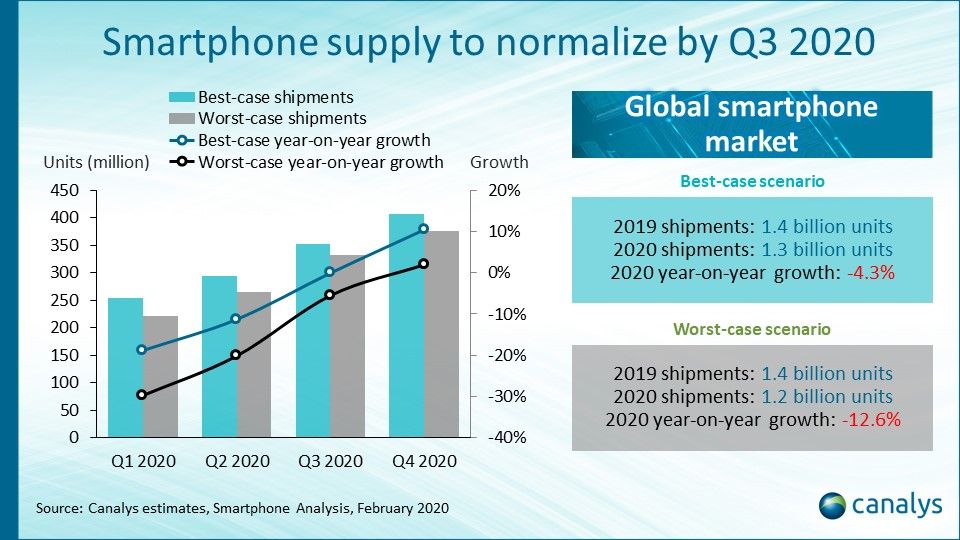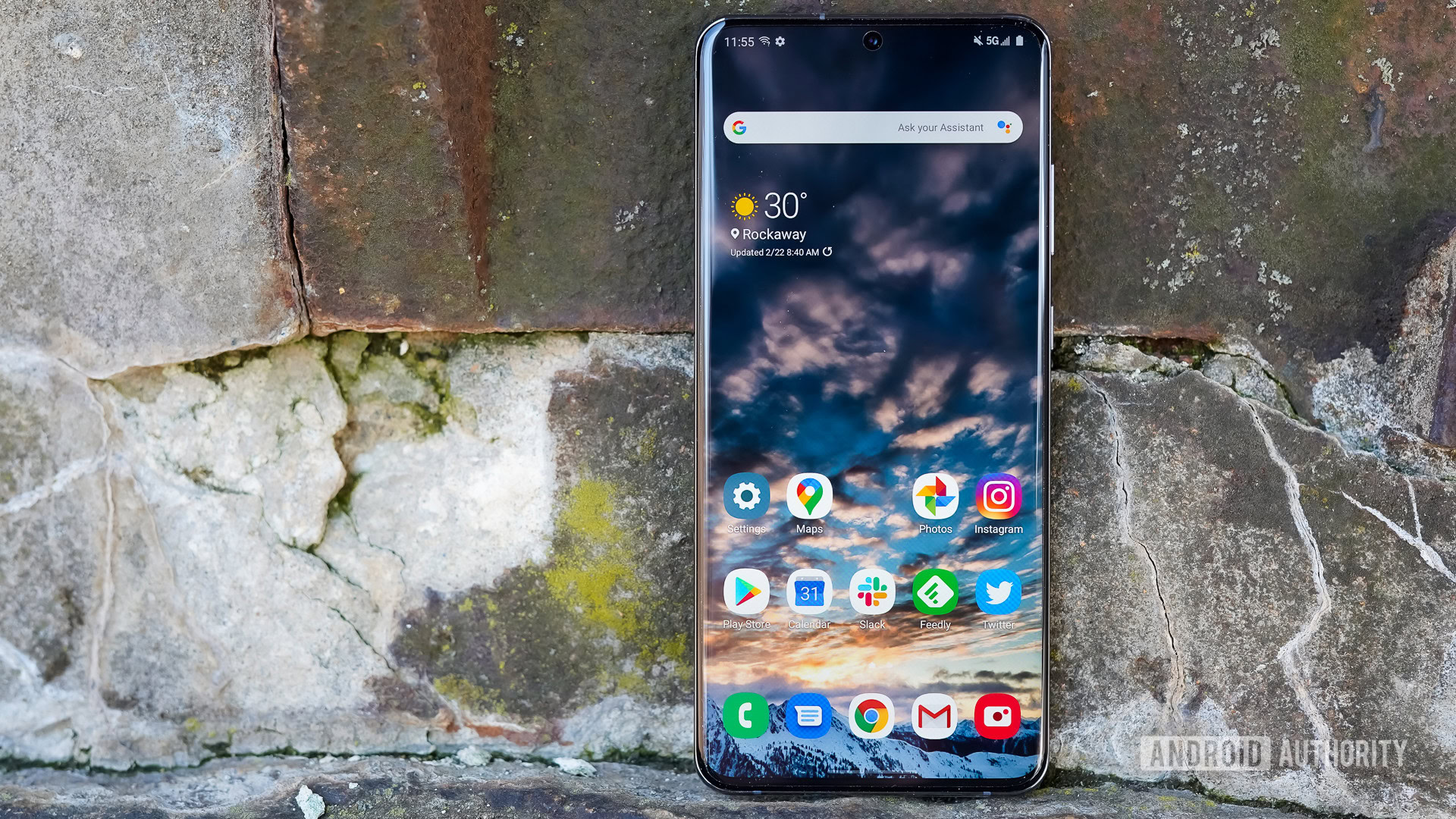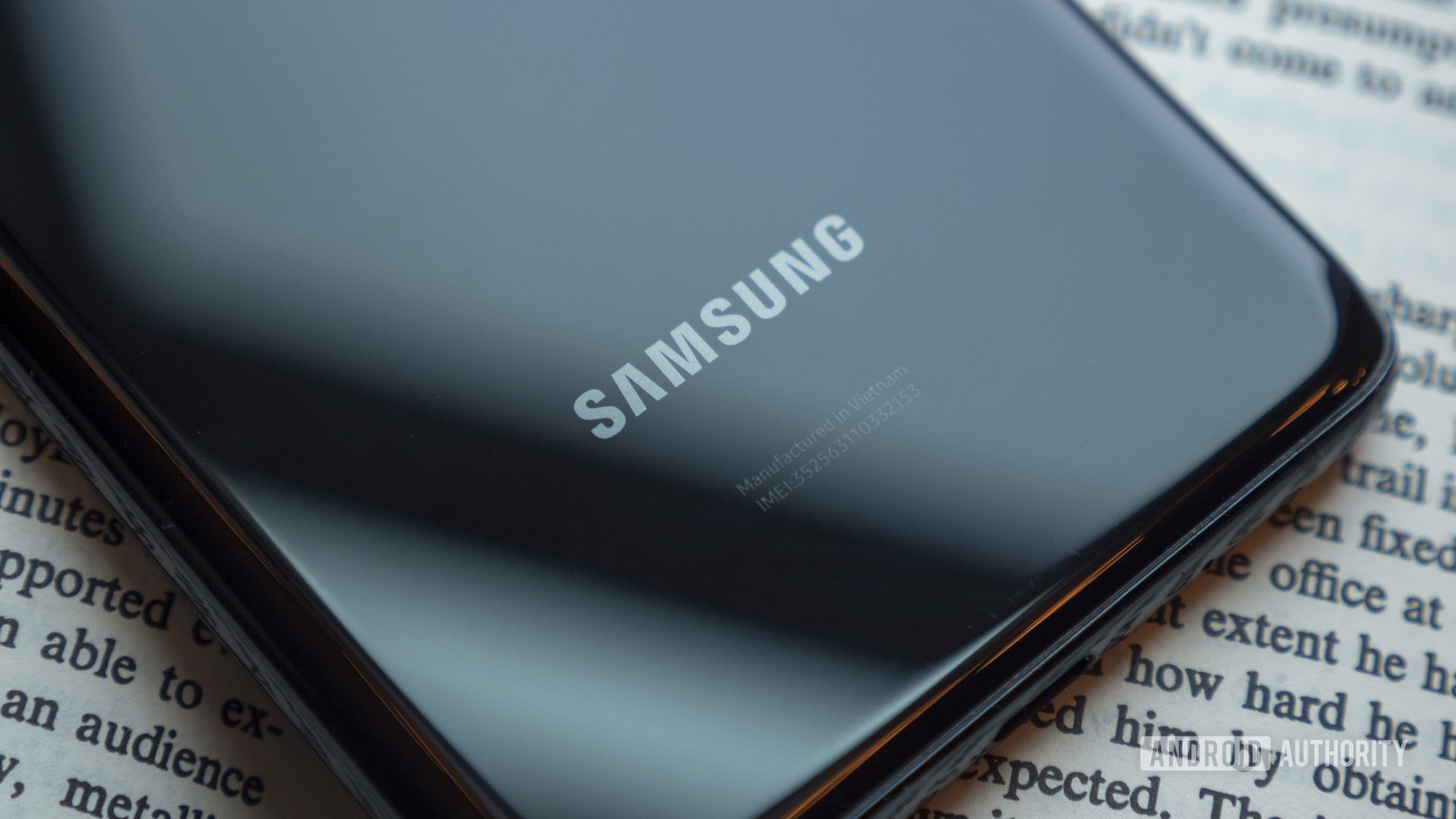Affiliate links on Android Authority may earn us a commission. Learn more.
Coronavirus pandemic: How will it impact the mobile industry?
March 14, 2020

The outbreak of COVID-19, better known simply as the coronavirus, has already had a major impact on the entire world.
As of this writing, over 135,000 cases of the coronavirus have been reported worldwide. While the majority of those cases come from China, the virus is spreading rapidly to other parts of the world, resulting in a death toll of nearly 5,000 people so far. Major outbreaks have happened in South Korea, Iran, and Italy. Much of Europe is under varying degrees of lockdown. The US has recorded over 1,300 cases, and the number continues to climb.
There’s still a lot we don’t know about COVID-19, which has just been declared a pandemic by the World Health Organization. What we do know is the pandemic will have a massive impact on global economy, including a wide and potentially lasting impact on the smartphone market.
Supply line disruptions, price hikes, product delays, launch cancellations, cutbacks in marketing events, and layoffs are all either happening already or a very real threat.
Here’s what we know so far about the coronavirus outbreak’s impact on the smartphone industry, and how it could shape its future in the coming weeks, months, and years.
Supply line disruptions are already happening
There’s one aspect that requires no speculation. The coronavirus outbreak is seriously disrupting global supply chains for smartphones and other devices. Much of the impact is localized in China, where a vast majority of electronics are produced, but supply lines in other countries are thrown into disarray. The industry relies on a deeply interconnected web of supply lines, meaning localized events can have unexpected, far-reaching consequences.
China has, by far, the most reported cases of COVID-19. As a result, the Chinese government has taken extraordinary efforts to slow down the spread of the virus by ordering people to stay home and effectively shutting down entire industries in the process.
Perhaps the best-known smartphone assembler, Hon Hai Technology Group (Foxconn), shut down its factories in China for several weeks in February 2020.
Perhaps the best-known smartphone assembler, Foxconn, shut down its factories in China for several weeks in February 2020. Hon Hai Technology Group (Foxconn) now claims it has started up production once again in its Chinese facilities, although it’s unknown how long it will take to get those factories up to their full capacity. Reports of temporary factory shutdowns in China by Samsung and LG Display have also emerged.
Sangeetika Srivastava, a senior research analyst with IDC’s Worldwide Mobile Device Trackers, stated that “component shortages, factory shutdowns, quarantine mandates, logistics, and travel restrictions will create hindrances for smartphone vendors to produce handsets and roll out new devices.”
It remains to be seen how the outbreak will ultimately affect supply lines, especially as the coronavirus spreads beyond China. For example, Samsung, LG, and Motorola have ceased or reduced production in their factories in Brazil due to lack of parts. This scenario could repeat itself over and over.

Research firm Canalys predicts that, in the best-case scenario, shipments of smartphones will go down by 4.3%, for a total of 1.3 billion units, in 2020. Shipment numbers could go down by as much as 12.6% in the worst-case scenario.
If these predictions turn out to be accurate, we will definitely see lower sales for smartphones, at least in the short term. Canalys does predict that smartphone shipments will bounce back to normal by the third quarter of 2020.
The silver lining is the situation in China appears to be improving rapidly. While big swaths of the country are still under lockdown, China is reporting fewer new coronavirus cases every day. South Korea, another manufacturing powerhouse, also appears to have the outbreak under control. While there’s no guarantee these positive developments will continue, it does bode well for the two hard-hit countries, as well as the electronics industry.
Will smartphones cost more or have delayed releases?

We are already seeing product supply issues affecting prices for some smartphones. In India, the Xiaomi Redmi Note 8’s price went up, according to India Today, with the company blaming the effects of coronavirus on its supply chain in China. This could happen for more handsets in the days and weeks ahead.
At the moment, we have little concrete information on smartphone companies delaying the release of major smartphones due to the coronavirus. While not officially confirmed, Motorola was rumored to launch the Edge, its first flagship in years, at the now-cancelled MWC trade show. We haven’t heard anything about it since then, suggesting Motorola might have delayed it.
Other smartphone OEMs are telling us that the pandemic is causing software development slowdowns as more employees either work from home or don't work at all.
Xiaomi’s global launch of the Mi 10 Pro was also supposed to happen at MWC in Barcelona. It’s been pushed back a full month to March 27.
Looking beyond smartphones, Konami’s TurboGrafx 16 Mini game console, was delayed indefinitely due to the outbreak. The device was scheduled to be released March 19, according to Polygon.
We might see some software updates get delayed for handsets as well. Xiaomi recently announced the Android 10 update for its Mi A3 phone has been delayed from a previously planned mid-February release. The company stated the delay was “due to the extended shutdown due to the global outbreak of coronavirus.” HMD Global also said it would push back its planned Android 10 updates for the same reasons. Other smartphone OEMs are telling us that the pandemic is causing software development slowdowns as more employees either work from home or don’t work at all.
More companies could move smartphone manufacturing out of China

After the rising workforce costs and the trade war fallout, the coronavirus outbreak is another reason for electronics companies to reassess their reliance on the Chinese manufacturing sector.
Some companies are reportedly already making plans to depend less on Chinese factories.
Some companies are reportedly already making plans to depend less on Chinese factories. The Nikkei Asian Review reported that Google has commissioned factories in Vietnam to make the upcoming Pixel 4a and will do the same for the high-end Pixel 5 as well. The same article says Google will use factories in Thailand to make some of its smart home devices. LG has also moved the manufacturing of its smartphones from China to Vietnam.
CNBC quotes research firm Kearney as saying it is feasible that many more companies will move manufacturing of modules and finished goods out of China. However, moving the entire component supply chain out of China could prove to be more difficult. Components are “a singular choke point as components are a necessary ingredient in modules and finished goods assemblies. This is very hard to move, as it requires entire ecosystems,” Kearney said.
The coronavirus outbreak will only accelerate the trend to make smartphones, and indeed many other products, out of China.
Shaking up trade shows and press events

In mid-February, the GSMA canceled the 2020 Mobile World Congress trade show in Barcelona out of coronavirus fears. That was before the outbreak even gained a large foothold in Europe.
The GSMA has confirmed to Android Authority that, following the cancelation of the 2020 MWC edition, it would “realign its priorities, including staffing, to continue to serve the evolving telecommunications industry and enable the rollout of 5G”. The statement seems to suggest that some layoffs at GSMA will happen, but specifics were not revealed.
Other major trade shows that were scheduled to be held in March, including the Game Developers Conference in San Francisco, the Geneva Auto Show, South by Southwest, the 2020 Google I/O developer conference, the E3 video game trade show, Microsoft Build, and most recently Apple’s WWDC have been canceled or postponed. Some job losses due to these cancellations are inevitable.
More and more major companies are now asking employees not to travel or to work remotely. All of Google's staff in North America now works from home, for instance.
More and more major companies are now asking employees not to travel or to work remotely. All of Google’s staff in North America now works from home, for instance. If the outbreak continues to get worse during the spring months, other tech could be reconsidered.
In the long run, smartphone companies could make some major marketing and PR changes in a post-coronavirus world. They could decide it’s cheaper to hold online events to launch new products, instead of holding massive press events. We have already seen this happen with Huawei, Sony, and Xiaomi holding virtual press events.
If companies decide virtual press events can do the job just as well as a huge press conference or attending a trade show, we could see fewer of these events in the months and years to come.
Who will benefit from the coronavirus outbreak?

We are already seeing major tech companies like Facebook, Microsoft, Google, Apple, and others asking their employees to work from home. Companies and organizations from many other industries are following suit, potentially giving online collaboration software a big boost.
Whether it’s out of charity, self-promotion, or a mix of both, players in the collaboration software space have announced moves meant to help organizations that need to adapt to remote work. Google is giving anyone free access to more advanced features of its Hangouts Meets service until at least July 1. Normally those features would cost $13 a month per user. Microsoft is also offering a six month free trial of its Teams software. These kinds of moves could be remembered by businesses affected by the coronavirus outbreak, which may turn them into paying customers once the crisis is over.
Similarly, people who have to stay at home will likely be using online delivery services more often. That’s both a challenge and an opportunity for the burgeoning delivery industry. Indeed, CNBC reports that customers of Amazon Prime Now in some parts of the US are already experiencing slowdowns in service. The same issues are also affecting Walmart’s next-day delivery services. But people still need to get food and other necessities, and this crisis may make them use delivery services more often.
Finally, people who are stuck at home will need to get some distraction after work is done. They will be able to watch TV and use streaming services on their smart TVs and phones. That could mean more use, and even more subscribers, for services like Netflix, Amazon Prime Video, Hulu, Disney Plus, Apple TV Plus, and more.
Video game purchases, on mobile, PCs, and consoles, could also get a boost if quarantines extend to longer periods. Ironically, this crisis comes along just as streaming game services like Google Stadia, Microsoft xCloud, and NVIDIA Geforce Now are ramping up. Before the outbreak, there have been many doubts that such services would be popular. It’s possible that they could see an increase in use if people are forced to stay home or get isolated for long periods of time.
The worst-case scenario: A global economic slowdown
Up until now, we talked about the direct effects of the coronavirus pandemic on the smartphone industry. But the biggest effect, and potentially the most damaging, will be indirect, stemming from a potential global recession caused by the coronavirus.
Right now, we don’t know what the final economic impact of the COVID-19 outbreak will be. If cases start to let up in the spring months, the final impact could be just a quarter or two of low to negative growth, perhaps mostly limited to industries with direct exposure.
If the coronavirus outbreak persists in the spring and summer months, or if it comes back in force in the fall, the economic impact could be much higher and broader.
If the coronavirus outbreak persists in the spring and summer months, or if it comes back in force in the fall, the economic impact could be much higher and broader. We have already seen global disruption in the travel industry, with some airlines cutting back their flights by as much as 20%. The International Air Transport Association recently said airlines could lose as much as $113 billion in revenue in 2020, depending on how widespread the virus gets. It’s the same situation with other sectors like tourism, hospitality, entertainment, and other services.
The problem is the world economy isn’t in a position to absorb big shocks. Part of the reason was the extended trade war between the US and China, which raised prices overall for many products. Much of Europe was already suffering from a stagnant economy, even before the coronavirus came along. In the US, the economy has been enjoying a record-long stretch of growth that was bound to end sooner or later. Even last year some experts were predicting a recession.

If we see extended mass closings of schools, businesses, and more in the US and beyond, it could push the world economy into a recession. That could lead to lower smartphone demand, which in turn may cause affected companies to lay off workers and close production lines. We could also see some consolidation in the industry, as smaller players are either bought by larger companies or shut down entirely. Even before the outbreak, many phone makers were operating on thin margins or even carrying losses.
All of this comes as the industry is trying to push 5G adoption in both phones and wireless networks. That was always going to be an expensive proposition.
A deep recession is, admittedly, a worst-case scenario for how the coronavirus outbreak could affect the smartphone industry. However, it’s not outside the realm of possibility. It’s possible a vaccine or treatment for the COVID-19 disease could be made in a year (the shortest amount of time it could happen). Even so, the US and even the world could slip into an economic decline that could take years to recover from.
In the end, we can’t know whether any of these predictions will happen this way. Let’s hope the long-term impact coronavirus outbreak is blown way out of proportion. For now, stay safe and be cautious out there.